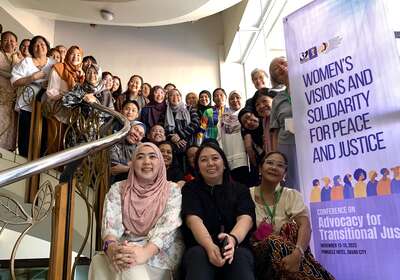Peacebuilding During Armed Conflict
Peace work begins long before negotiations — even amid conflict, activists can lay the groundwork for transformative change. We support women to prepare for and shape the post-conflict future.
Our programmes create spaces where women can develop and advance their diverse efforts to achieve lasting peace. Our goal is the full, equal, meaningful and safe participation of women in all phases of peace processes. Together with them, we advocate for a feminist understanding of peace that questions power relations and strives for transformative change.
In every context, the people working for peace are those who are closest to armed conflict and most affected by it. They have the expertise, knowledge and relationships to bring about change in their societies. Peace activists and women's organisations play a particularly important role in building and maintaining peace and preventing armed conflict.
Women are not inherently more peaceful, but their diverse life experiences often strengthen their empathy, resilience and determination to tackle complex challenges and demand necessary structural change. These are skills that are essential for building lasting peace.
In our programme work, and in our network activities, we implement our “ABC of feminist peacebuilding” in collaboration with our partners:
A is for amplifying women's voices, visions and demands and incorporating them into decision-making processes. Our national, regional and international advocacy initiatives create access to relevant decision-making processes and decision-makers.
B is for boosting women's peace efforts. We offer peace activists and peace organisations strategic support by jointly developing and implementing peacebuilding programmes.
C is for connecting peace activists around the world. Our Feminists Connecting for Peace network offers safe and inclusive spaces, opportunities for exchange and learning, and raises awareness of our partners' efforts.
Guided by our vision for inclusive and gender-just peace processes worldwide and our feminist understanding of peace, we focus our programme work on peacebuilding during armed conflicts, during peace negotiations and after armed conflicts. Our programme work aims to give women the support they need to participate meaningfully and equally in all phases of peace processes.
Thanks to our experience in these three programme areas, we are able provide our partners with long-term, strategic support to bring about inclusive peace processes and prevent setbacks. We act as a financial bridge, advisor and ally, strengthening the capacities of our partners and promoting exchange between peace activists and women's organisations in different contexts.
We use a graphic representation to illustrate what role women play at different stages of peace processes and how they exert influence at the different stages.
Since 2015, we have been organising Women's Peace Tables with our local project partners with the aim of sustainably strengthening the participation of women in peace processes and making their engagement in peacebuilding visible. They have become a proven method for achieving these goals.
Our programmes focus on three thematic areas:
Peace work begins long before negotiations — even amid conflict, activists can lay the groundwork for transformative change. We support women to prepare for and shape the post-conflict future.
The full and equitable participation of women in peace negotiations leads to more sustainable agreements. We strengthen women's participation by linking the formal and informal initiatives of women.
Together with our partners, we work to ensure that peace activists play an active role in implementing peace agreements as well as in processes of dealing with the past after armed conflicts.
Here you can find information about completed programmes and projects.
In a graphic representation of the different stages of peace processes, we place the role of women at the centre. It shows where they exert influence to drive the peace process and prevent setbacks. The graphic is available in English, German, Spanish and Ukrainian.
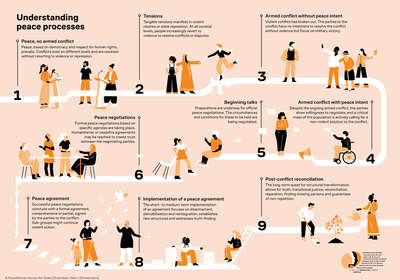
The swissinfo podcast asks the question that drives us in our work: "Where are the voices of women in peace talks?" Deborah Schibler and Larissa Mina Lee took part in the discussion.
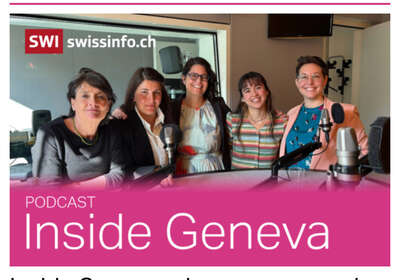
In an article in the March issue of à propos, our director Deborah Schibler explains why the current images and narratives on the subject of "peace processes" need to become feminist.
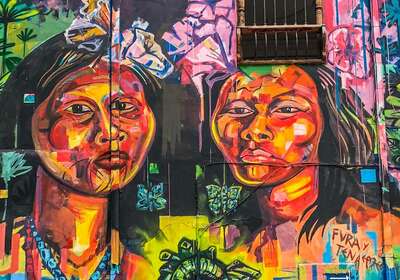
Together with our partners in Colombia, Nepal and the Philippines, we have developed a handout to creatively present and share the insights we have gained together on peacebuilding after armed conflicts.
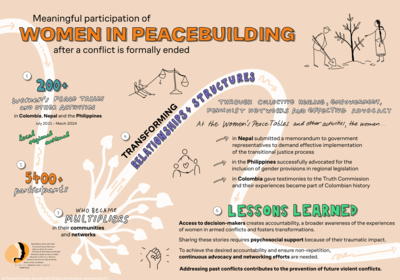
For more than a decade PeaceWomen Across the Globe has been working in close partnership with three organisations in Colombia, Nepal and the Philippines. What these countries have in common: They have formally ended armed conflicts, but there is still no peace. Women peacebuilders from these countries will share their achievements and insights on sustaining the peace momentum during transitional justice processes and preventing backsliding into armed conflict. Join us to find out what applicable lessons can be drawn from these three contexts.
